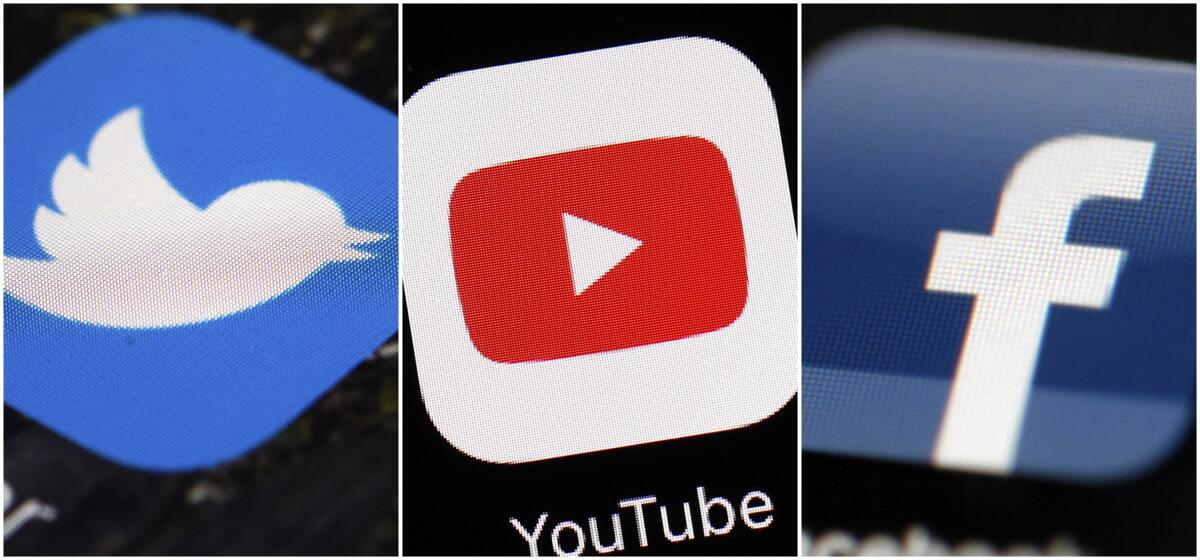The Supreme Court is right to be cautious. Section 230 reform is Congress’ job

- Share via
The Supreme Court seemed reluctant this week to narrow legal protections for internet companies so that families of the victims of terrorist attacks could sue social media sites they think bear some responsibility for their loved ones’ deaths. The justices’ caution is appropriate.
Congress should determine whether there are to be changes in Section 230 of the Communications Decency Act, not the court. That 1996 law protects interactive websites such as YouTube and Twitter from lawsuits stemming from content posted on those sites by third parties, while making it clear that such platforms can exclude objectionable material including content that is “excessively violent.”
On Tuesday the justices heard oral arguments in a case brought by the family of Nohemi Gonzalez, who was killed in Paris in 2015 when Islamic State terrorists fired into a restaurant where she was dining with friends. A lawyer for the family argued that Google, YouTube’s parent company, should be subject to a lawsuit under an anti-terrorism law because the site’s algorithms create recommendations for pro-terrorist videos — for example, by displaying thumbnails of similar videos.
Big Tech and others defending Instagram and its ilk don’t address a youth mental health crisis in their filings with the Supreme Court in a Section 230 case.
Section 230, a provision that looms large in arguments — some of them misinformed — about government regulation of the internet, serves an important purpose. By protecting websites from lawsuits based on content posted by third parties — while allowing websites to exclude dangerous material — the law has encouraged the growth of companies that rely on user-generated content, to the overall benefit of consumers.
Section 230 also has been good for public-service journalism. A friend-of-the-court brief filed by the Reporters Committee for Freedom of the Press notes that the law “protects the free exchange of ideas and information on the online platforms on which journalists rely to identify sources, investigate stories, provide accurate coverage on events of public concern, and engage personally with their audiences.”
This doesn’t mean that Section 230 is sacrosanct and can’t be revisited more than two decades after its enactment. In fact, it’s a good idea given how much the internet has evolved over the last 27 years. But Tuesday’s argument demonstrated that the task of refining the law is best left to the branch of government that created it. We agree, as dysfunctional and partisan as the current Congress may be, it’s still the appropriate venue for updating internet regulation. As Justice Elena Kagan put it, the justices of the Supreme Court are not “the nine greatest experts on the internet.”
Supreme Court justices sounded split over whether social media firms can be sued for aiding terrorists.
It’s possible that another case, argued before the court on Wednesday, might make it unnecessary for the justices to rule on the scope of Section 230. In that case, the question is whether Twitter (and other social media companies) may be sued under the federal Anti-Terrorism Act for allegedly failing to take meaningful steps to exclude Islamic State material. The anti-terrorism law, which also figures into the Gonzalez case, defines aiding and abetting to include “knowingly providing substantial assistance” to a person who commits an act of international terrorism — a difficult standard. During Tuesday’s argument, Justice Amy Coney Barrett asked whether “we even have to reach the Section 230 question” if the court were to rule for Twitter.
The Supreme Court has a unique role to play in determining whether laws regulating the internet are consistent with the 1st Amendment. That question looms large in challenges to laws in Florida and Texas that provided for fines and damage claims against Facebook, Twitter and other social media sites if they discriminate against some political points of view. But when it comes to Section 230 immunity, the court should let Congress decide what, if any, changes are to be made.
More to Read
A cure for the common opinion
Get thought-provoking perspectives with our weekly newsletter.
You may occasionally receive promotional content from the Los Angeles Times.










